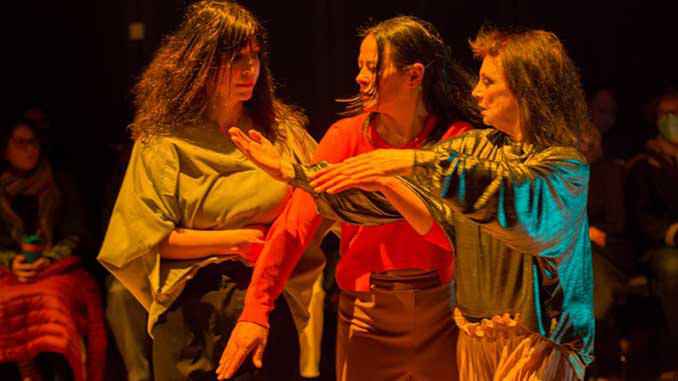Review: Conquest of the Garden
“An artful foray into the important life work of this dedicated activist/artist and an homage to all female artists who follow in her brave footsteps.”
Originally published on Australian Arts Review
“Everyone is afraid everyone is afraid, but you and I joined with the lamp and water and mirror and we were not afraid.” – Forugh Farrokhzad
These were some of the most memorable passages of poetry recited at the immersive performance, Conquest of the Garden, from a poem of the same title, by Iranian feminist poet Forugh Farrokhzad.
Part poetry reading, part dance performance, choreography by Nebahat Erpolat brought to life the writings of Farrokhzad and drew audiences into an engrossing story of love, loss and longing.
The passage, recited in refrains, goes on “I’m talking about my fortunate tresses with the burnt anemone of your kiss and the intimacy of our bodies and the glow of our nakedness.”
Through the dance performance the lustrous nature of Farrokhzad’s poetry is embodied: light and darkness; trauma and solace meet in the same auditorium and are expressed in each of the dancers’ bodies.
The fraternisation between darkness and light; solitude and company; acceptance and doubt are deeply explored through movement, motifs, scenery and props.
As soon as we walk into the space we catch sight of a raw plastered hanging canvas as a backdrop, which is repeatedly painted upon during the performance, some of the script in Turkish, Farsi, Kurdish and English, some visible, some not.
The set becomes a palimpsest for memory and emotion; the wall symbolic of entrapment and punishment, palpably reminding us of how Forugh Farrokhzad was ostracised and persecuted owing to the honest nature of her writing about feminine desire and strength.
In both the titular poem of the piece and the choreography, there is a conflict and tension between freedom, symbolised by the garden, and more sinister intrusions upon that privacy, via the image of crows flying overhead in the poem and, in the performance, a hanging display of audience ID cards above the performers.
The work was intentionally disturbing in this way, as the dancers asked audience members to give up their ID, and at other perturbing moments, where a garbage-bag-clad figure entered the dimly lit auditorium and undressed to full nudity in silence under strobe lighting.
Masks and concealment were motifs throughout the performance as one dancer entered the space in a brightly sequined black gown and latex mask, leading into a poetic soliloquy in Farsi and graceful belly dance.
There seemed to be a degree of reclamation here of feminine power as she shimmied in a glittering robe and applied lipstick to her lips, peeking out from under the mask. Full body covering is sometimes seen as the privation of feminine sensuality but this scene skillfully subverted this.
In this way, desire and freedom, tinged with constraint and tragedy was expressed so well in Erpolat’s creation. A hallmark of her choreography is the lack of stable meaning to grasp, multiple perspectives and counter- narratives are explored through the dancer’s bodies and voices yet all resonate with the collective themes of love and loss.
Having knowledge of some of the foreign languages spoken in the dialogue, namely French and Kurdish, I found myself zeroed in on certain refrains, likewise noticing the emotional registers transcending linguistic borders. The word ‘fear’ was repeatedly echoed for example, as well as the equivalent, ‘la peur’, in French.
“Everything in the work is intentional…” Erpolat told me later in an interview. Speaking English as a third language after Kurdish and Turkish herself, she invites a multitude of audience connection with the work depending on their cultural background and life experiences, all the while testing the idea that language or movement have fixed meaning.
The final section of the piece was luminous, where Nebahat and co-dancer Victoria came on with a pair of silver fabric wings and whirled, dervish-like around the space, reciting passages about ‘any angled’ light spilling through the window.
Farrokhzad was referred to pejoratively by conservative critics in Iran as ‘ostrich’, Erpolat told me, an ostentatious and soulless bird, flamboyant and superficial. The use of the shiny wings as a prop again served as a motif for reclaiming her power, as a woman fearlessly in pursuit of freedom for herself and others.
Conquest of the Garden was an artful foray into the important life work of this dedicated activist/artist and an homage to all female artists who follow in her brave footsteps.
Conquest of the Garden
Northcote Town Hall Arts Centre, 189 High Street, Northcote
Performance: Thursday 18 August 2022
Season: 18 – 20 August 2022 (ended)
Read more about the work
Conquest of the Garden
An interdisciplinary dance presentation on the work of feminist Iranian poet Forough Farrakhzad.


